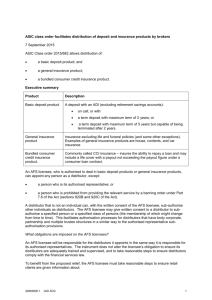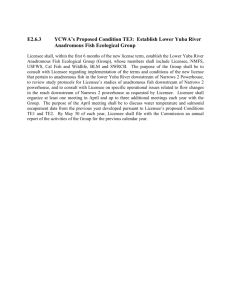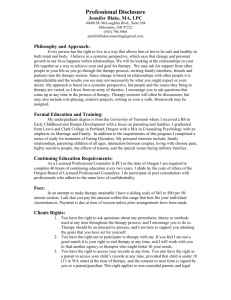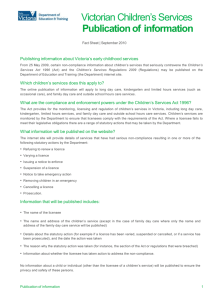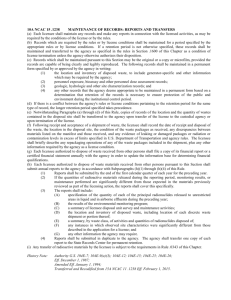FSC Submission to ASIC re Consultation Paper 214: Updated
advertisement
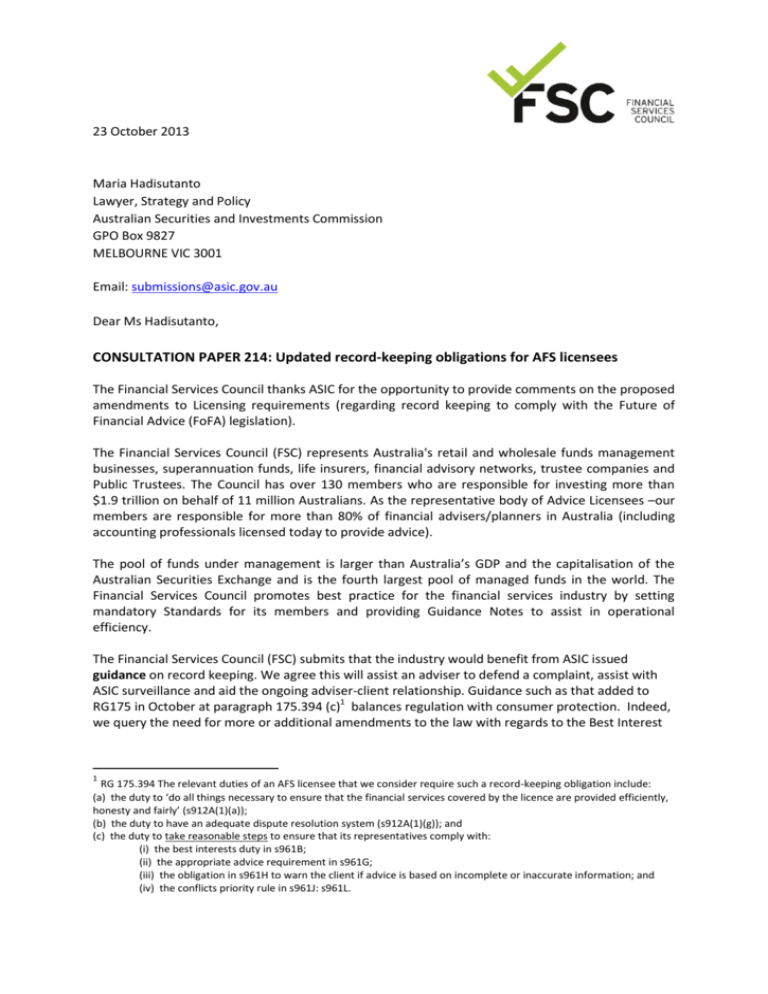
23 October 2013 Maria Hadisutanto Lawyer, Strategy and Policy Australian Securities and Investments Commission GPO Box 9827 MELBOURNE VIC 3001 Email: submissions@asic.gov.au Dear Ms Hadisutanto, CONSULTATION PAPER 214: Updated record-keeping obligations for AFS licensees The Financial Services Council thanks ASIC for the opportunity to provide comments on the proposed amendments to Licensing requirements (regarding record keeping to comply with the Future of Financial Advice (FoFA) legislation). The Financial Services Council (FSC) represents Australia's retail and wholesale funds management businesses, superannuation funds, life insurers, financial advisory networks, trustee companies and Public Trustees. The Council has over 130 members who are responsible for investing more than $1.9 trillion on behalf of 11 million Australians. As the representative body of Advice Licensees –our members are responsible for more than 80% of financial advisers/planners in Australia (including accounting professionals licensed today to provide advice). The pool of funds under management is larger than Australia’s GDP and the capitalisation of the Australian Securities Exchange and is the fourth largest pool of managed funds in the world. The Financial Services Council promotes best practice for the financial services industry by setting mandatory Standards for its members and providing Guidance Notes to assist in operational efficiency. The Financial Services Council (FSC) submits that the industry would benefit from ASIC issued guidance on record keeping. We agree this will assist an adviser to defend a complaint, assist with ASIC surveillance and aid the ongoing adviser-client relationship. Guidance such as that added to RG175 in October at paragraph 175.394 (c)1 balances regulation with consumer protection. Indeed, we query the need for more or additional amendments to the law with regards to the Best Interest 1 RG 175.394 The relevant duties of an AFS licensee that we consider require such a record-keeping obligation include: (a) the duty to ‘do all things necessary to ensure that the financial services covered by the licence are provided efficiently, honesty and fairly’ (s912A(1)(a)); (b) the duty to have an adequate dispute resolution system (s912A(1)(g)); and (c) the duty to take reasonable steps to ensure that its representatives comply with: (i) the best interests duty in s961B; (ii) the appropriate advice requirement in s961G; (iii) the obligation in s961H to warn the client if advice is based on incomplete or inaccurate information; and (iv) the conflicts priority rule in s961J: s961L. and related duties given the amendments and additions to Regulatory Guide 175 in October 2013 such as RG175.394. We do not agree with the proposals documented in Consultation Paper 214 and are in particular concerned about the cost and effort to comply with these proposals as stipulated especially in light of the fact many of these proposals offer no additional benefit to the client i.e. the point of diminishing value – but has the real impact of increasing the cost of advice. It can not be overstated how time consuming, expensive, disruptive and unproductive it will be to have to revisit FoFA related systems, policies and processes to capture these proposed record keeping obligations. This paper aims to highlight the FSC’s key concerns and provides recommendations for consideration and responses to ASIC’s questions. We look forward to working with you to provide guidance to the industry on what type of records Licensees and advisers should maintain to assist providers to comply with FoFA. If you have any questions regarding the FSC’s submission, please do not hesitate to contact me on (02) 9299 3022. Yours sincerely CECILIA STORNIOLO SENIOR POLICY MANAGER FSC SUBMISSION CONSULTATION PAPER 214: Updated record-keeping obligations for AFS licensees October 2013 KEY ISSUES 1. Amendment of the Law by Class Order We understand that a Class Order approach generally offers ASIC the ability to efficiently update the references in PS209 that is used as the template for AFS Licensees and carry that through to existing license conditions. This makes sense given the inefficiencies involved and time it would take to update each AFSL individually (the AFSL needs to be given the opportunity to appear in front of a panel where they can object to the changes). However, we query why any further amendments are required given the recent amendment to ASIC Regulatory Guide 175 already amend record keeping obligations with regards to the Best Interests and related duties. Further we disagree with the addition of other items to a Class Order that could instead be released in the form of an ASIC Regulatory Guide (Regulatory Guide). The proposed Class Order would also does not cover all of the record keeping obligations that would be relevant to financial planners in the provision of financial product advice so the development of a Regulatory Guide or Information Sheet, in our view, would provide an opportunity to have all record keeping obligation guidance in the one document which is likely to result in greater industry awareness of the regulators expectations with regards to record keeping more generally. Recommendations The FSC recommends that the Class Order be limited to updating AFSL references from the repealed s945A and sp45B to Part 7.7 and 7.7A of the Corporations Act 2001 (Cth) (Corporations Act). The FSC submits that ASIC should refrain from exercising their power under the ASIC Act to “change the law” unless absolutely necessary given it undermines the legislative due process. Matters in this consultation paper were negotiated with the government during the consultation stages of the FOFA Bills – the financial advice industry needs to have confidence that due process will be followed given the amount of money it costs large financial services businesses to alter systems and processes, and conduct training. We submit it is important to ensure the policy intent of the government remains at the core of any obligations that seek to achieve them. Explanatory Memoranda (EM) explain the contents and purpose of a bill in plain English. Explanatory Memoranda contain a clause by clause description of a bill. The website of the Australian Parliament states Explanatory Memoranda “…are documents that assist members of Parliament, officials and the public to understand the objectives and detailed operation of the clauses of a Bill.” The relevant Act’s EM in this case, the Corporations Amendment (Further Future of Financial Advice Measures) Bill 2011, states the following in relation to Pt 7.7 and 961B(2) (Best Interests Duty and safe harbour) of the Corporations Act: “1.21 This general obligation is supplemented by a provision setting out steps that, if the (advice) provider can prove they have taken, will be taken to satisfy the general obligation. These steps have been set out based on the specific conditions under which advisers currently operate. This approach is needed given the broad nature of a best interests obligation; it may allow a provider to demonstrate that it has complied with the obligation by proving it took certain steps.” “1.23 There are (7 safe harbour) steps that providers may prove they have taken to demonstrate that they have acted in the best interests of the client. … These steps recognise that the requirement to act in a client’s best interests is intended to be about the process of providing advice, reflecting the notion that good processes will improve the quality of the advice that is provided.” “1.29 Requiring the provider to demonstrate it has satisfied the steps in subsection (2) reflects the fact that it is the provider, rather than the client or the regulator, that is best placed to prove whether or not the steps were taken. This does not relieve the party taking action for breach of the best interests duty of the onus of proving non‑compliance with that duty.” When reflecting on the above, it is apparent the Government did not intend, nor think it appropriate, to prescribe the records to be kept or the manner in which they were retained. Instead it is clear they believed the focus should be on the process undertaken “reflecting the notion that good processes will improve the quality of the advice that is provided”. In determining if the Best Interests duty safe harbour step requirements have been met, the Government clearly felt the focus should be on whether good processes are in place and whether these processes have been followed. We submit this should underpin guidance from the regulator. It is our view that any guidance provided needs to be principles based given the subjectivity involved. This is particularly relevant with regards to evidencing compliance with step 7 of the Best Interests duty safe harbour. 2. Who keeps the records We discuss our concerns regarding this issue within each specific proposal. However, the matter of who keeps the records is of critical importance to the cost implications of practically implementing these proposals. We note that the phrasing of B1 and B3 may work where the employee advisers are located in the same premises as the Licensee and/or the Superannuation Fund Trustee is also the advice licensee. However, the phrasings used in the proposals do not reflect the majority of the industry where authorised representatives are geographically spread and operate out of their own premises. The current wording, ‘the licensee (or trustee) must retain a record of the following matters’, does not suggest there is any flexibility to accommodate the majority of the industry nor current industry practices. In the case of B1, we suggest the appropriate obligations are for a Licensee to ‘cause its Authorised representatives to keep’ the specified records at the time the records are created. In the case of B3, we suggest the appropriate obligation are for the Superannuation Fund Trustee to ‘cause the Licensee or Authorised representatives acting under an arrangement with a trustee to keep’ the specified records at the time the records are created. The record keeping proposals as stipulated will cause the industry to change practices and require the industry to invest in another significant change program to comply. Please see the next section of this submission for our detailed responses to each proposal. 3. Cost Please see Appendix 1. We note that costs to comply with these proposals will run into the $100s of millions for the industry. 4. Implementation We note ASIC’s comments in paragraph 41 and 42 of the Consultation Paper is to take a facilitative approach to compliance with, and enforcement of, the additional record keeping requirements until 30 June 2014. It is important to place these proposals into context and recognise as ASIC notes in paragraph 40 that the industry has faced major legal and regulatory works due to the significant changes associated with FOFA, TASA and Stronger Super reforms. Given FoFA has already commenced and Stronger Super is nearing its start date we note that the industry has already implemented (or nearing completion of) significant new processes, trained staff, invested in and built IT infrastructure, priced services and products et cetera to operate in the new regimes. We note that any change in the law by Class Order or substantive regulatory guidance which causes changes to industry practices such as those proposed in this Consultation Paper will likely require further industry change and as such the industry requires appropriate time to be able to comply. Should ASIC proceed with these proposals, we estimate that the industry will require at least a minimum 12 months from the finalisation date of the instrument to allow the industry time to comply. Were ASIC to consider alternative guidance or information which largely reflects current practices, the industry may be better placed to comply by 1 July 2014. DETAILED RESPONSE Record-keeping obligations when giving personal advice to retail clients B1 We propose to modify the law, by way of class order, to require that, when an AFS licensee or its representatives provide personal advice to retail clients, the licensee must retain a record of the following matters (whether in a material, electronic or other form) for at least seven years from the date that the personal advice is provided: (a) the information relied on and the action taken by the advice provider that show the advice provider has acted in the best interests of the client for the purposes of s961B(1); (b) if s961B(2) is being relied on to show that s961B(1) has been complied with, the information relied on and the action taken by the advice provider that satisfy the safe harbour steps in s961B(2); (c) the advice, including reasons why advice is considered to be ‘appropriate’ within the meaning of s961G; (d) where an advice provider knows, or reasonably ought to know, that there is a conflict between the interests of the client and the advice provider, or one of their specified related parties, the information relied on and the action taken by the advice provider that show the advice provider has given priority to the client’s interests when giving the advice for the purposes of s961J; (e) any ongoing fee arrangement entered into with the client within the meaning of s962A; (f) any assignment of an ongoing fee arrangement; (g) a fee disclosure statement given to the client under Div 3 of Pt 7.7A; (h) a renewal notice given to the client under Div 3 of Pt 7.7A; (i) any notification from a client given under Div 3 of Pt 7.7A that they elect to renew their ongoing fee arrangement; and (j) any fees charged after the termination of an ongoing fee arrangement. We propose that the requirements in B1(a)–B1(c) do not apply to: (k) personal advice for which an SOA is not required; or (l) personal advice for which a record of the advice is kept in accordance with s946B(3A), as modified by regs 7.7.09 and 7.7.10AE of the Corporations Regulations. We understand that the proposals B1(a)-(d) aim to ostensibly replace s945A and s945B Licensee record keeping obligations previously contained in RG175. However, we do not support the proposals as contained in this Consultation Paper (CP) for the following reasons Issue 1: The B1 proposal stipulates the Licensee must retain records; We contend that the proposal as stipulated will create significant IT investment and significant changes to existing industry arrangements. We understand that this is not ASIC’s intention as noted in paragraph 20 where ASIC states that the ‘obligations are not designed to impose an additional administrative burden on the industry”. FSR created a legal obligation on the Licensee as the ‘advice provider’. Under FoFA, the advice provider may not be the Licensee but the actual adviser (for example the authorised representative). It is current market practice for Licensees to have arrangements to ‘store’ client records where the adviser is an employee representative. Even in this scenario the costs of complying with these proposals are expected to be significant (see appendix 1). Where the advice provider is an authorised representative, current market practice is for the Licensee to contract with the authorised representative, for the authorised representative to maintain client records – thus avoiding significant IT build and duplication of efforts/cost which are ultimately borne by the adviser’s clients. We note that there is no evidence that the current process (of contracting out the record keeping obligation to the authorised representative), combined with appropriate monitoring and supervision by the Licensee, has resulted in systemic of the authorised representative to keep adequate records. Furthermore, there does not appear to be any greater protection to the consumer by incurring the cost to implement this solution. It would certainly increase the cost and decrease the accessibility to access advice given these costs would inevitably be passed on to the consumer. Practically, the advice provider is likely to be physically located in a different location to the Licensee, and the client file (either in paper or electronic form) will be with the client adviser. It is neither practical nor cost effective to suggest that the adviser and the Licensee should maintain a record of the same file. To do so will require: If the adviser keeps paper files, it will require staff who’s function will include daily or frequent scanning of files to transmit to a Licensee; OR IT build/infrastructure investment to maintain electronic records; and IT build between the adviser and the Licensee to enable data to flow from one office to another across the country; and IT expense to store/maintain servers (clearly the Licensee will need multiple feeds into this server and a large server plus data recovery site to maintain all the records); and These advice businesses will need significant internet/broadband capabilities and investment to transmit data on a daily basis or other frequency. Issue 2: Cost versus consumer benefit We contend the duplication of cost and effort is unwarranted especially when balanced against the consumer benefit. That is, there is no commensurate improvement in consumer protection as a result of better advice records. There is not evidence to suggest that more record keeping results in better processes and therefore better advice outcomes for consumers. If concerns are about improving the advice process then we submit that efforts are best directed at further guidance in this area and perhaps benefits could be gained by bringing the Regulatory Guidance to life in ASIC seminars. While we understand that the licensee is not absolved from record keeping obligations, historically, record keeping obligations have been measured against adequacy of compliance arrangements and we contend as per ASIC RG 175.3942, that the relevant duties of an AFS licensee in that regard remain to: (a) do all things necessary to ensure that the financial services covered by the licence are provided efficiently, honesty and fairly’ (s912A (1) (a)); and (b) have an adequate dispute resolution system (s912A (1) (g)). ASIC argues in Report 362 that in the case where Licensees rely on contractual arrangements – that it is difficult for a Licensee to respond to complaints or inquiries when/after an adviser leaves the Licensee or fails to cooperate when information is requested that Licensees should therefore retain access to client records in a more proactive way (e.g. by using electronic storage platforms). Therefore, in our view if the Licensee contracts out the obligation and/or provides appropriate monitoring and supervision to ensure client files are maintained for seven years (including checking Best Interests duties, Fee Disclosure Statements and conflict of interest), albeit produced and backed up at the adviser’s premises (the authorised representative), and that the Licensee obtains access to client files when an adviser leaves, then the Licensee’s record keeping obligation is met. Proposals B1(e)-(h) impose new obligations which do not replace a previous obligation in RG175. The proposed amendments by way of class order impose additional legal obligations that would be better addressed by the legislature, who had the opportunity to impose these obligations as part of the FoFA reforms but declined to do so. If a licensee or representative has failed to keep adequate records, it may affect the licensee or authorised representative if either the licensee or authorised representative is challenged on a failure to comply with the client’s best interests or the client priority rule. If the licensee or authorised representative is unable to prove that they did not breach the FoFA obligations, then it will be to the detriment of the licensee or authorised representative, not the client. If an authorised representative is unable to provide records demonstrating that they have acted in the client’s best interests, then the representative is unlikely to be successful if the matter went to FOS or Court. We confirm our support the intent of appropriate record keeping. We agree this will assist an adviser to defend a complaint, assist with ASIC surveillance and aid the ongoing adviser-client relationship. However, these proposals need to be weighed against the cost of compliance so that advice costs do not put advice out of reach of Australians who need it. Again we contend we contend as per ASIC RG 175.394, that the relevant duties of an AFS Licensee include: (a) the duty to ‘do all things necessary to ensure that the financial services covered by the licence are provided efficiently, honesty and fairly’(s912A(1)(a)); (b) the duty to have an adequate dispute resolution system (s912A(1)(g)); and (c) the duty to take reasonable steps to ensure that its representatives comply with: (i) the best interests duty in s961B; (ii) the appropriate advice requirement in s961G; (iii) the obligation in s961H to warn the client if advice is based on incomplete or inaccurate information; and (iv) the conflicts priority rule in s961J: s961L. 2 Note the relevant reference is RG175.394 October 2013 issue of RG175 – formerly referenced RG175.398 (December 2012 version) Recommendation We submit and support that ASIC educate and inform the industry regarding industry best practice record keeping either via a Regulatory Guide or an Information Sheet on what types of records to maintain to comply with FoFA. B1Q1 Do you agree with our proposed record-keeping obligations for AFS licensees on the new conduct obligations in Pt 7.7A? If not, why not? No we do not agree with ASIC’s proposed amendment to Licensing record keeping obligations by Class Order thus amending FoFA requirements. See above. We suggest the obligations are for a Licensee to ‘cause its Authorised representatives to keep’ the specified records at the time the records are created. If the intent of the Class Order is to update AFSL conditions where the repealed s945A and s945B of the Corporations Act is referenced to Pt 7.7 and Pt 7.7A of the Corporations Act the wording being proposed goes further. PF 209 currently states “the licensee … must ensure that copies of … documents are retained…”. In contrast, CP209 proposes to require that “the licensee must retain a record”. If this is simply a drafting error it is a rather significant one as it implies the records need to be kept by the Licensee which infers on the Licensee’s premises. Copying these records, transporting them across the country, providing resources to despatch, receive and store them in addition to the actual storage and/or investment in IT infrastructure to enable the process to be electronic would create a significant cost impost on Licensees. There is no evidence to suggest the cost would provide any more protection to a consumer than the current industry standard of retaining these records at the Corporate Authorised representative businesses’ and requiring them to be made available for inspection by the Licensee, regulator or as otherwise statutorily required. The alternative option of transferring electronic records to the Licensee may, prima facie, seem to be a more efficient and cost effective method. Multiple Licensees have sought to design such a solution and found, mainly due to the large number of systems that their authorised representatives use (many of which are legacy systems) the cost is prohibitive. The practice of compliance officers travelling around the country conducting site audits for every practice at least annually is a more cost effective solution which is insightful given it is still a considerable expense for the Licensee. Therefore, it is our view that guidance or Information regarding best practice record keeping will be more of assistance to the industry and a better outcome for consumers. B1Q2 Will our proposed record-keeping obligations require AFS licensees to significantly change their existing record-keeping practices? If so, please describe the changes and the likely costs involved. Yes, these proposals will take some, in particular the larger AFSLs in excess of 12 months to build/implement and rollout training and other obligations to advisers. If we come back to the Explanatory Memorandum paragraph 1.21 states “(t)hese steps have been set out based on the specific conditions under which advisers currently operate.” It stands to reason that being able to provide evidence that pre-FOFA steps to provide quality advice have been undertaken rather than seeking to change the way advice is provided. This would indicate the policy intent was never intended to be overly onerous, nor to subject the advice provider to unreasonable costs in order to comply. It is difficult for the industry to assess the full impact of the proposed amendments, together with the changes required and likely costs involved, given uncertainty around ASIC’s proposed amendments (what does adequate records mean, do Licensees and advisers (ARs) need to both keep records for example). Nonetheless, on the basis that Licensees are permitted to contract-out of their record-keeping obligations as is current practice, we anticipate likely costs of in the $100s of millions to cover: Review and update of Licensee standards on records management across their respective relevant advice businesses; Training to advice providers on updated record keeping obligations, particularly in relation to record keeping for conflicted remuneration; Potential system impact – data required to comply with record-keeping for Fee Disclosure Statements (FDS) and ongoing service arrangements; Update to training on FDS in light of record-keeping obligations; Cost to separately administer record-keeping for conflicted remuneration for general advice – cost to set up records management standard, train advice providers and potential system impact. There are also indirect costs anticipated – driving up the cost and accessibility of advice, which goes against the intent of FoFA Reform. Further, these changes and their likely costs go against the intent of the proposed amendments, which as ASIC states [at paragraph 20 of the CP] are “… not designed to impose an additional administrative burden on industry.” If ASIC does intend that the Licensee “must maintain a record” then we anticipates that costs will need to be incurred for the following at a minumim: Contractual arrangements in place today will require amendment (to change what the Licensee will nor require the authorised representatives to do going forward to enable the Licensee to meet ASIC’s Class Order): If the adviser keeps paper files, it will require staff who’s function will include daily or frequent scanning of files to transmit to a Licensee; OR Transportation of files (by road/plane) to Licensee; OR if the Licensee and adviser choose to keep electronic records it will require: o IT build/infrastructure investment to maintain electronic records; and o IT build between the adviser and the Licensee to enable data to flow from one office to another across the country; and o IT expense to store/maintain servers (clearly the Licensee will need multiple feeds into this server and a large server plus data recovery site to maintain all the records); and o These advice businesses will need significant internet/broadband capabilities and investment to transmit data on a daily basis or other frequency; and There is also the real issue of having to revisit FOFA related systems, policies and processes to ensure they capture the new obligations. B1Q3 Are there any practical problems with the implementation of our proposal? Please provide details. In summary we see the following practical problems associated with these proposals: Obligations are unclear: ASIC needs to clarify who is required to keep the records, the licensee or the authorised representative (or both). We submit that while it may be reasonable for the Licensee to keep important records of client facing documents such as the Statement of Advice and Fee Disclosure Statement, additional records in relation to compliance with FoFA obligations should be kept by the affected party but not as a matter of law (ie representative providing advice for best interest obligations would keep adequate records to prove that they followed the best interests safe harbour steps if challenged). We submit that the record keeping obligations can be contracted out as per current practices – as contracts are legitimate legal vehicles and current market practice. For example as long as the Licensee is able to obtain the records from the authorised representative within a reasonable time upon request, it should be held to comply with the record keeping obligations. Obviously if the representatives were employees then the Licensee can ensure it keeps adequate records itself. It the authorised representatives are external, the Licensee would need to ensure that the record keeping obligations for its authorised representatives were clearly spelt out in the agreement between the Licensee and authorised representatives. The Licensee would obviously need to conduct regular compliance audits on its authorised representatives to ensure that the authorised representative is keeping appropriate records. Providing this monitoring is adequate, the licensee should not be penalised if the authorised representative is not able to produce adequate records of particular transactions, as long as this is not systemic. The record keeping obligations should be modified to reflect that the Licensee does not have to keep all of the records itself so long as it can legally compel the authorised representatives to supply the records upon request. Recommendation The FSC recommends that ASIC issue guidance by way of a Regulatory Guide on the use of contractual arrangement by Licensees to meet their record keeping obligations. In addition, with the lack of clarity, there is a real risk of Licensees overcompensating and adopting a more conservative approach due to fear in breaking the law that is over-compliance. It remains unclear what records the regulator expects the advice provider to maintain to meet the obligation. For example what are “adequate records” – do you mean file notes which are adequate records currently. We contend that examples be used to demonstrate what ASIC intends – especially an example to demonstrate prioritisation of conflicts. The proposal implies retrospective application (prior to FoFA’s application). It is manifestly unreasonable to expect that Licensees or authorised representatives could already be expected to be keeping the additional records set out in this CP. These obligations should only apply to advice provided after the record keeping obligations have been released in final form. Obviously licensees and authorised representatives do currently keep records to comply with their current obligations but not to the extent that ASIC is seeking in this CP. Timeframe: The new obligations will introduce significant cost and impacts to Licensees e.g. technology upgrades (planner and licensee), value proposition challenges and increased costs to clients (Affordability). There is also the real issue of having to revisit FOFA related systems, policies and processes to ensure they capture the new obligations. Depending on the final obligations, Licensees and authorised representatives should receive at least one year of facilitative compliance from the date that the record keeping obligations are released in their final form. If the record keeping obligations are modified by Class Order and remain in their current form, the period for mandatory compliance should be even longer. Cost to comply is heavy burden without any consumer benefit. If the record keeping obligations are not modified and require that Licensees keep all records, the costs and time to implement systems to achieve this will be significant. Large Licensees that have a large number of non employee authorised representatives will need to develop an IT system that works with all of the systems of the non employee authorised representatives. Alternatively, the licensee will need to provide a standard IT system to all of its authorised representatives and mandate its use. To achieve this will involve significant costs to develop the IT system, lengthy system testing, ensuring that all authorised representatives are appropriately trained on the new system, obtaining feedback from representatives and making further system developments, monitoring use of the system etc. Depending on the size of the Licensee, this may take years to develop. If the Licensee and the adviser are to both retain records, the IT infrastructure investment/build is likely to be in excess of $100Million across the industry. We contend that the obligation to keep records to prove compliance is embedded in FoFA law not to mention ASIC RG175.394. The proposals deliver no additional consumer benefits. will increase cost of running advice business negatively impacting affordability of advice. B1Q4 We propose to update our guidance in Section E of RG 175 and Section C of RG 245 to reflect the updated record-keeping obligations. Do you think we should provide any further guidance on our proposed record-keeping obligations? If so, please provide details. We do not support the proposals in CP214 but we see merit in ASIC providing the industry with information (INFO Note) or Regulatory Guidance generally about what types of records advice providers should consider keeping demonstrating compliance with FoFA. We note that Regulatory Guide 175 has already been amended (October 2013) with regards to record keeping obligations to comply with the Best Interest and related duties. Record-keeping obligations in relation to conflicted remuneration B2 We propose to modify the law, by way of class order, to require that, when an AFS licensee or its representatives provide financial product advice to retail clients, the licensee must retain a record of the following matters (whether in a material, electronic or other form) for at least seven years from the date that the advice is provided: (a) any arrangement, or any change to an arrangement, on the basis of which the licensee considers that the conflicted remuneration provisions in Divs 4 and 5 of Pt 7.7A do not apply to the licensee or its representatives because of the transitional provisions in s1528–1531 of the Corporations Act and the regulations made under those sections; (b) any payments made or accepted under arrangements to which the conflicted remuneration provisions in Divs 4 and 5 of Pt 7.7A do not apply to the licensee or its representatives because of s1528–1531 of the Corporations Act and the regulations made under those sections; and (c) where the licensee relies on the exemptions in s963B or 963C of the Corporations Act, or Div 4 of Pt 7.7A of the Corporations Regulations, to form the view that a monetary or nonmonetary benefit that is given to the licensee or its representatives is not conflicted remuneration, records demonstrating the circumstances on which this reliance is based. B2Q1 Do you agree with our proposed record-keeping obligations for AFS licensees on the new conduct obligations in Pt 7.7A? If not, why not? No we do not agree with ASIC’s proposed record keeping obligations to amend legislation by Class Order. We note that these proposals were the subject of approximately two years of industry consultation and the specific legal obligation to maintain records were not adopted by the legislative process. Further we note that Division 4 contains regulation powers and as such should record keeping obligations be expressly required, we submit these amendments be made by regulation. Division 5 does not have regulation powers included in the legislation to allow for additional legal obligations to be made or to amend the requirements. On this basis we query ASIC’s proposal to amend FoFA law by Class Order. As long as the Licensee is comfortable that it is not receiving conflicted remuneration and is capable of defending this position if challenged. We note that s963F states the obligation on an Licensee is to take reasonable steps to ensure conflicted remuneration is not accepted. On many occasions the Licensee will have relied on privileged legal advice to determine whether a particular payment arrangement is conflicted. This advice should not become a record that ASIC can review unless the Licensee expressly agrees to release it. (a) Do you think there is a more cost-effective way to ensure that AFS licensees comply with the conflicted remuneration provisions in Divs 4 and 5 of Pt 7.7A? Please provide details. A more cost effective way of ensuring compliance for the Licensee would be not requiring the Licensee to keep records of all determination involving conflicted remuneration. On many occasions, it will be obvious to the Licensee as to whether a payment is conflicted or whether it falls within an exemption and it should also be obvious to ASIC. If an arrangement is grandfathered, the licensee will need to be able to prove that an arrangement existed which it will often be able to do by producing the agreement or course of conduct over a long period of time that demonstrates an arrangement is in place between the parties. We see merit in we see merit in ASIC providing the industry with information (INFO Note) or Regulatory Guidance generally (RG246) about what types of records Licensees should consider keeping demonstrating compliance with FoFA. (b) Do you think it is appropriate to require AFS licensees to keep records to demonstrate the circumstances on which it relies to form the view that a monetary or non-monetary benefit is not conflicted remuneration because of the exemptions stated in Proposal B2(c)? If not, why not? No, it is not appropriate. As long as the Licensee is comfortable that it is not receiving conflicted remuneration and is capable of defending this position if challenged, it should not be required to keep records on hand that can be readily inspected by ASIC. On many occasions the licensee will have relied on privileged legal advice to determine whether a particular payment arrangement is conflicted. This advice should not become a record that ASIC can review unless the Licensee expressly agrees to release it. Otherwise, the License can defend any ASIC investigation in the usual way. For example, we see no merit in the need to keep records for all non-conflicted remuneration decisions. Insurance is exempt in some cases, so there would be no need for a licensee to demonstrate this. B2Q2 Will our proposed record-keeping obligations require AFS licensees to significantly change their existing record-keeping practices? If so, please describe the changes and the likely costs involved. It will mean records will often need to be kept to demonstrate that payments are not conflicted when this will often be obvious. It is also unclear whether this will need to be kept for every client, or at account level or whether a single record will be required for all clients that fall within the same arrangement that the licensee has with the product provider who is providing the benefit. While licensees will need to be able to prove that have not breached the conflicted remuneration provisions, they should not have to do so unless that are legitimately challenged by ASIC that the benefits they are receiving are conflicted. B2Q3 Are there any practical problems with the implementation of our proposal? Please provide details. Yes, licensees and product providers will on many occasions have relied on privileged legal advice to determine whether a benefit is conflicted or not. This should not be available for ASIC to inspect upon request. We note that flexibility regarding retention of non-monetary benefit records is desirable especially as certain benefits may be received by an authorised representative without the Licensee’s knowledge. We submit that whilst the obligation may rest with the Licensee, that the flexibility of the Licensee contracting record keeping obligations with the adviser is efficient and pragmatic and likely to result in better/more timely records. B2Q4 We propose to update our guidance in Section B of RG 246 to reflect our updated recordkeeping obligations. Do you think we should provide further guidance on our proposed recordkeeping obligations? If so, please provide details. We welcome additional guidance in RG246 (although we have yet to see what ASIC proposes to include here) but not as a modification of the law by class order. Record-keeping obligations when giving intra-fund advice B3 We propose to modify the law, by way of class order, to require that, when the trustee of a regulated superannuation fund (as an AFS licensee) provides personal advice to members of the fund, the trustee must ensure that they retain a record of the following matters (whether in a material, electronic or other form) for at least seven years from the date that the personal advice is provided: (a) the advice, including a note to identify whether the cost of the advice is allowed to be charged to a member or members other than the recipient and, if so, on what basis—unless the cost is in fact wholly charged or borne in one or more of the following ways: (i) charged to the member receiving the advice; (ii) borne by the licensee if the licensee is not the trustee or an associate; and/or (iii) charged to a person other than the trustee or an associate; and (b) if the cost of the personal advice is not allowed to be charged to a member or members other than the recipient, a note identifying: (i) how much it cost to provide the advice, including details about the method of calculation and why any estimation applied in the calculation is reasonable; and (ii) how much the member receiving the advice was charged for the advice and how the cost was otherwise borne or charged. This requirement would also apply to AFS licensees acting under an arrangement with a superannuation trustee, where the licensee or its representatives provide personal advice to members and that advice is charged for collectively. AFS licensees would also be required to keep records in a way that enables the information to be readily provided for a particular period, if requested to do so by ASIC. B3Q1 Do you agree with our proposed record-keeping obligations for superannuation trustees, and AFS licensees acting under an arrangement with a trustee, when providing intra-fund advice to members? If not, why not? We do not agree with the proposed amendment in its current form as it is not clear on whom the obligation rests. We assume ASIC’s intention is for the obligation to rest with the advice Licensee (which might also be the Superannuation Fund Trustee and/or a third party advice provider and/or a third party administrator who also provides advice) and that contracting-out of that obligation is permitted. We submit that one party, the party providing the personal advice to the superannuation member carry the record keeping responsibility. To require the Superannuation Fund Trustee and the advice provider to maintain records is to require a significant amendment to processes, IT infrastructure investment and development – a duplication of effort and cost without any commensurate consumer benefit. We assume that the collectively charged intra-fund advice provider (which may be the Superannuation Fund Trustee or a third party be they a related party or not) is not required to comply with these record keeping obligations given B3 states that ASIC proposes to apply these obligations to the personal advice providers only. We oppose B3 on the basis that where personal advice is provided to the superannuation member, and the client agrees on the service and the fee, that the fee is simply a “fee for service” as permissible by FoFA and as such the additional requirements stipulated here are a significant divergence from FoFA policy and legislation. Further the 3rd tranche of the Super legislation permits a Trustee to collect either: collectively charged (non transparent) advice fees from members regardless of whether they access the advice for the potential provision of intra fund advice or fee for service advice fees charging to an individual for personal advice provided. FoFA imposes numerous disclosure requirements on advice providers and this level of prescription as proposed for advice collected from a super fund was not endorsed by either the FoFA nor MySuper legislature. B3Q2 The objective of our proposal is to give greater certainty to superannuation trustees, and AFS licensees acting under an arrangement with a trustee, about the records they need to keep to comply with the requirements in s99F of the SIS Act. Do you think there is an alternative way for ASIC to meet this objective? Our view is that these matters are more efficiently addressed by way of Regulatory Guidance (as opposed to an amendment in the law by Class Order) or Information Sheet. B3Q3 Will our proposed record-keeping obligations require superannuation trustees, and AFS licensees acting under an arrangement with a trustee, to significantly change their record-keeping practices? If so, please describe the changes and the likely costs involved. Yes, see B1Q2 previously. C Regulatory and financial impact Cost impacts would be important in this submission to showcase that the balance between consumer protection V impact to industry is completely inappropriate with regards to these proposals. See Appendix 1.


